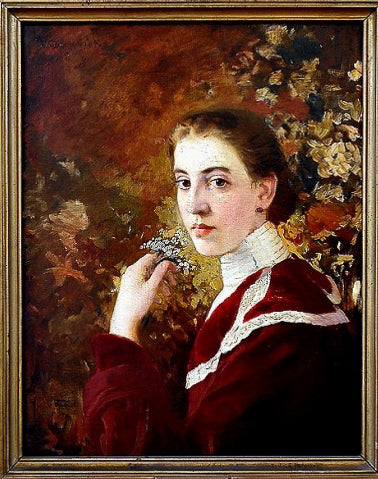Description
Ivan Mrkvička's 1912 Portrait of a Young Woman is a fascinating example of the Czech painter's talent, whose works are situated at the intersection of symbolism and modernist art. This painting captures the essence of a female figure whose depiction transcends mere physical appearance, immersing us in a world of sensations and emotions.
From the first glance, the composition of the work reveals itself to be carefully thought out. The model's face occupies almost the entire pictorial space, with a deep gaze that seems to communicate directly with the viewer. The woman's position, slightly turned to one side, suggests an air of introspection and mystery. Her expression, serene but enigmatic, invites reflection on her history and personality. This approach to the portrait of an individual figure reflects a trend in modernism, where the artist seeks to explore personal identity rather than conform to classical formulas.
The use of colour in this painting is particularly notable. The soft tones that dominate the canvas – blues, pinks and neutrals – combine to create an ethereal and almost dreamlike atmosphere. The colour range employed by Mrkvička helps to convey a sense of calm and elegance. The light falls subtly on the woman’s face and hair, highlighting certain features and creating delicate shadows that add volume. This handling of light and colour is a hallmark of the author, which is framed within a broader context of symbolism, characterised by a search for the spiritual and the emotional in his works.
The background of the painting is equally significant. Instead of a detailed or representational background, a predominance of neutral colours is used, suggesting an undefined space. This not only serves to focus attention on the main figure, but also reinforces the idea that the woman portrayed is a symbol of transcendent beauty, which goes beyond her physical existence. In this way, Mrkvička succeeds in creating a connection between the viewer and the portrait; a connection that goes beyond the physical frame of the painting.
Ivan Mrkvička, who was influenced by symbolism and the avant-garde movements, shows in this work a synthesis of his personal experiences and experiences. The women in his art often reflect a mix of sensuality and fragility, a recurring theme found in various works of his career. Compared to other contemporary works, such as those of Gustav Klimt, Mrkvička's approach is more subtle and less embellished, allowing him to explore the psychology of his model without resorting to excessive ornamentation or decorative elements.
The work “Portrait of a Young Woman” is not just a visual representation of a woman; it is a study of the perception and interpretation of beauty in a context that invites contemplation. Through her use of colour, balanced composition and introspective expression of the figure, Mrkvička manages to give this painting a relevance that outlasts its time and resonates with today’s audiences’ interests in subjectivity and emotional experience. Through this portrait, the viewer is not just an observer, but a participant in the dialogue that is established between the artist, the model and the observer, evoking universal questions about identity, meaning and the mystery of life.
KUADROS ©, a famous painting on your wall.
Hand-made oil painting reproductions, with the quality of professional artists and the distinctive seal of KUADROS ©.
Painting reproduction service with satisfaction guarantee. If you are not completely satisfied with the replica of your painting, we will refund 100% of your money.

